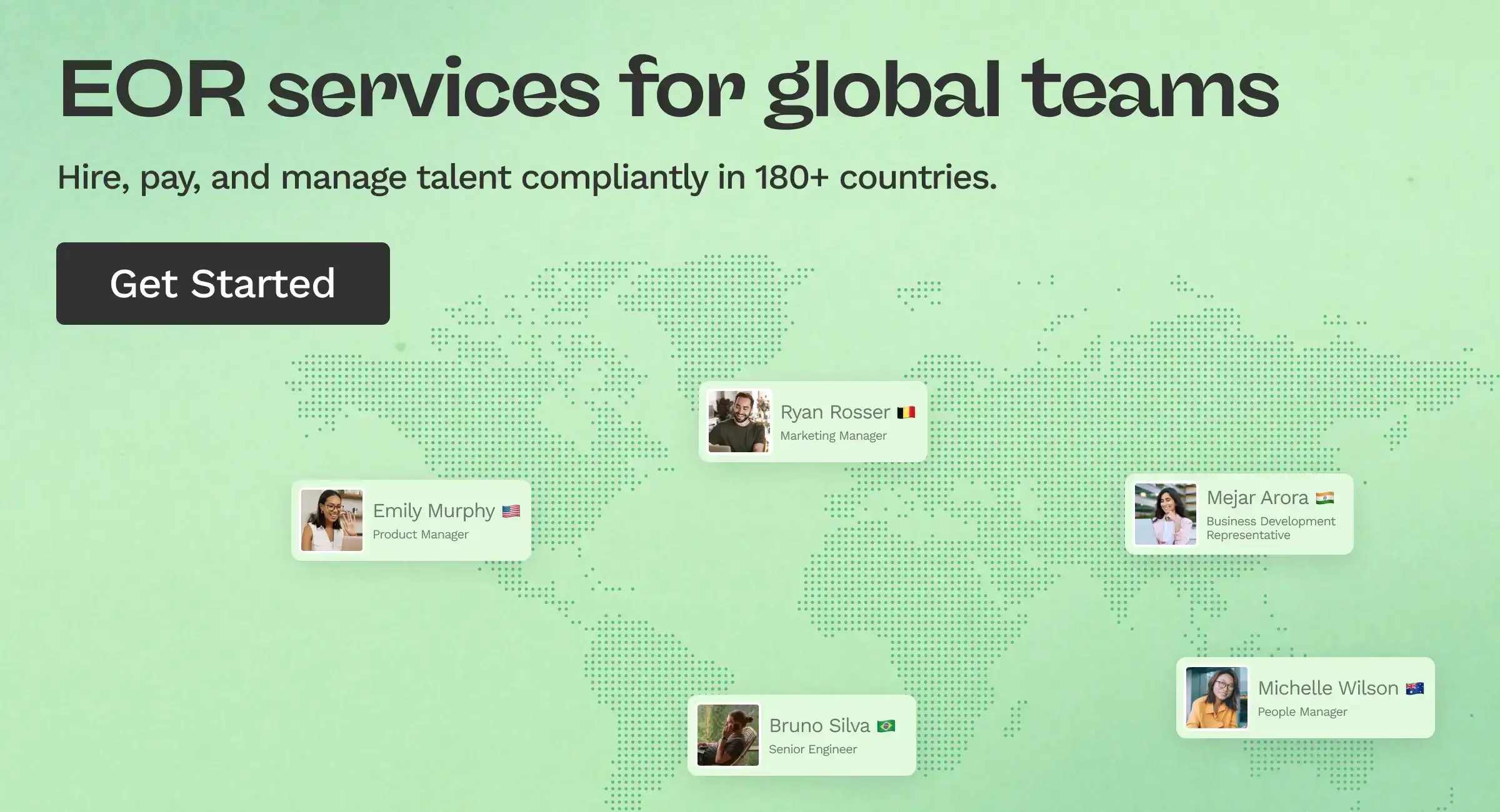Holiday pay in the Philippines shapes how employers budget and manage their team’s work. Regular holidays, special non-working days, and special working days each come with their own pay rules. Knowing how and when to expect someone in the office—and how to compensate them when parts of the country take a break—might take a little research.
If your company is based outside of the Philippines, the holiday breakdown may be very different from your standard holiday process. For employers, misunderstanding those rules can lead to payroll errors and disputes. And for team members, it can mean missing out on income they're entitled to.
Getting clear on how holiday pay works protects everyone. When you’re aware of the rules, you can ensure fair treatment and avoid costly misunderstandings before they happen.
This guide breaks down when and how holidays in the Philippines change compensation structures and who qualifies for special pay, as well as formulas to calculate different kinds of holiday pay.
What is holiday pay in the Philippines?
Not every holiday automatically comes with paid time off. In the Philippines, only employees covered by the Philippines Labor Code are eligible for additional pay on government-declared holidays. Holiday pay eligibility for many workers also depends on factors such as job classification, employment terms, and even company size.
Your company policy may also influence holiday pay. Regular holidays, for example, come with the highest compensation by law. If an eligible employee doesn’t work, they’re still given 100% of their daily wage. If they do choose to work, holiday pay jumps to 200%. But a team member might only earn a wage not working on a special non-working day if your company has already agreed to pay.
The importance of holiday pay in the Philippines
Holiday pay affects more than just a line on a payslip. It’s also a key factor in compliance with local labor laws and overall hiring costs—and fair treatment for everyone on your team. When everyone understands how it works, expectations are clear and the risk of errors and disputes can drop significantly. That consistency builds trust, whether you’re located in the Philippines with your team or not.
Applying the right rules to the right people is a key part of running compliant payroll. If you’re working through an employer of record (EOR) in the Philippines, the EOR will handle holiday pay, so you won’t have to worry about missing an important payment.
Types of holiday pay in the Philippines
Holiday pay in the Philippines isn’t one-size-fits-all. Compensation rules vary depending on government classifications for each day.
Here’s a breakdown of the main categories.
Regular holiday
The government officially declares regular holidays as fixed national observances. People in the Philippines observe these holidays nationwide to mark historical events and national milestones.
Eligible team members receive 100% of their daily wage even if they don’t report to work. If they do, their rate doubles—200% for the first eight hours. If they work overtime or on a rest day, additional premiums apply.
Regular holidays in the Philippines are:
- New Year’s Day (January 1)
- Maundy Thursday (the Thursday before Easter in March or April)
- Good Friday (the day after Maundy Thursday)
- Araw ng Kagitingan (April 9)
- Labor Day (May 1)
- Independence Day (June 12)
- National Heroes Day (last Monday of August)
- Bonifacio Day (November 30)
- Christmas Day (December 25)
- Rizal Day (December 30)
Special non-working day
Special non-working days are usually declared for cultural events, local commemorations, or special observances. While they’re officially recognized by the government, they don’t carry the same mandatory pay structure as regular holidays.
The rule of thumb for compensation on special non-working days is “no work, no pay.” If an employee works on one of these days, they earn 130% of their daily rate for the first eight hours. If it’s also their rest day, the rate goes up to 150%.
These holidays include:
- Ninoy Aquino Day (August 21)
- All Saints’ Day (November 1)
- New Year’s Eve (December 31)
Special working day
This kind of holiday is declared by the government for symbolic or civic reasons, but isn’t tied to rest or additional pay. Work proceeds as normal, and payroll follows standard weekly rates.
There’s no premium pay on these days. Team members receive their regular daily rate, and only those who work are paid.
Special working days include:
- EDSA People Power Anniversary (February 25)
- Christmas Eve (December 24)
- All Souls’ Day (November 2)
Who qualifies for holiday pay?
In the Philippines, most—but not all—private sector employees qualify for holiday pay under local labor laws.
Who qualifies?
Holiday pay applies to employees who are not in a managerial role and whose hours worked and output are monitored by their employer. Monthly-paid and daily-paid employees are both covered, whether they’re regular, probationary, or project-based.
There’s one exception to this rule: Employees need to be present or on paid leave (such as maternity leave) the day before the holiday. This requirement ensures continuity between the employee’s last work day and the holiday.
Who is exempt?
The Labor Code excludes specific categories of employees from receiving holiday pay, including:
- Government employees, including those in government-owned and controlled corporations.
- Managerial employees, but only if they meet all the legal criteria for managers: having hiring and firing power, managing two or more people, and regularly exercising independent judgment.
- Managerial staff who spend most of their time on high-level tasks (not admin or support), such as supervisors and technical specialists.
- Retail and service employees in establishments with fewer than 10 workers.
- Kasambahays (domestic workers), including househelpers, gardeners, and similar roles.
- Field personnel whose hours and performance aren’t tracked by their employer.
- Employees on a purely task, contract, or commission basis, but only if their role also meets the definition of a field worker.
Companies considering hiring independent contractors should note that these workers typically fall outside standard holiday pay requirements. Remote workers in the Philippines should be treated the same as their in-office counterparts when it comes to holiday pay.
Computing holiday pay in the Philippines
Whether the day is a regular holiday, special non-working day, or special working day, here’s how to calculate holiday pay in the Philippines.
How to calculate regular holiday pay
If an employee is eligible for holiday pay, they will earn money on a regular holiday. How much they earn depends on how much they work that day.
1. If the employee doesn’t work
Employers must pay employees 100% of their daily rate on regular holidays, even if they don’t report to work.
Example: An employee earning ₱1,000/day who doesn’t work on Rizal Day still receives ₱1,000.
2. If the employee works
Working on a regular holiday entitles them to double pay: 200% of their daily rate for the first eight hours.
Example: The same employee earns ₱2,000 for working on Christmas Day.
3. If the employee works overtime
Overtime pay in the Philippines during regular holidays adds another 30% on top of the double pay rate.
Example: An employee normally earning ₱1,000/day who works 10 hours on Independence Day would earn ₱2,000 of regular pay (₱1,000 × 2), with ₱650 for two hours of overtime pay (₱125 × 2 × 1.3 × 2) for a total of ₱2,650 for their day.
This differential pay structure ensures employees receive fair compensation reflecting their work during designated holidays.
How to calculate special non-working holiday pay
Unlike regular holidays, special non-working holiday pay isn’t mandatory.
1. If the employee doesn’t work
Employers typically don’t pay employees who don’t work on special non-working holidays unless their company policy states otherwise.
Example: Employer A doesn’t pay for time off on Ninoy Aquino Day. Employer B has an internal agreement to pay employees who don’t work on special non-working holidays, so their employees are paid on Ninoy Aquino Day whether or not they work.
2. If the employee works
Many employees choose to work on special non-working days. Those who do are entitled to 130% of their daily rate for the first eight hours.
Example: An employee who earns ₱1,000/day would receive ₱1,300 on New Year’s Eve.
3. If the employee works overtime
If an employee works overtime on a special non-working day, employers calculate total pay by stacking the 130% holiday rate with overtime at 169%.
If you’re wondering how to compute overtime pay in the Philippines for this scenario, multiply the hourly rate by 1.69 for each overtime hour.
Example: An employee earning ₱1,000/day has an hourly rate of ₱125. 10 hours of work on All Saint’s Day means they earn ₱1,300 for the first eight hours (₱1,000 × 1.3), plus ₱422.50 for two overtime hours (₱125 × 1.69 × 2). That totals ₱1,722.50 for the day.
Holiday pay rules in the Philippines
The Philippines’ Department of Labor and Employment (DOLE) updates rules about holiday pay yearly. Here are the most relevant from 2025:
- Regular holiday (not worked): Employees receive 100% of their daily rate, as long as they were present or on paid leave the day before.
- Regular holiday (worked): Work during a regular holiday is compensated with 200% of the daily rate for the first eight hours.
- Regular holiday + overtime: An additional 30% is added to overtime, for a total of 260% above eight hours.
- Special non-working day (not worked): Non-workers aren’t paid by default unless company policy or a collective bargaining agreement says otherwise.
- Special non-working day (worked): Workers receive 130% of their daily rate for the first eight hours.
- Special non-working + rest day: Pay rises to 150% for the first eight hours worked.
- Special non-working + overtime: Work beyond eight hours earns 195% (130 x 1.5) of the employee’s daily rate.
- Special working day: Employees earn their regular rate on special working holidays, with 125% pay for overtime hours. That means special working holiday pay follows regular weekday rules, unless company policy offers something extra.
Is holiday pay taxable?
Yes, holiday pay is taxable for most employees in the Philippines. The only exception is minimum-wage earners (MWEs). If an employee is classified as an MWE, their holiday wage—along with their overtime, night differential, and hazard pay—is exempt from withholding tax.
Streamline global employment and compliance with Oyster
If you’re expanding into the Philippines, you don’t have to navigate complex employment laws and compliance requirements on your own. With Oyster’s EOR service, you can compliantly hire, onboard, and pay talent without setting up a local entity. We’ll handle payroll calculations like holiday pay while you focus on building your team.
Learn how Oyster’s EOR solution can help you grow your team in the Philippines and around the world.

About Oyster
Oyster is a global employment platform designed to enable visionary HR leaders to find, engage, pay, manage, develop, and take care of a thriving distributed workforce. Oyster lets growing companies give valued international team members the experience they deserve, without the usual headaches and expense.
Oyster enables hiring anywhere in the world—with reliable, compliant payroll, and great local benefits and perks.
.webp)



.webp)



.webp)





_Leader_Leader%201%20(2)%20(3).svg)
_Leader_UnitedKingdom_Leader%201%20(1).svg)
_Leader_Europe_Leader%201%20(1).svg)
_Leader_Mid-Market_Leader%201%20(1).svg)
_Leader_Small-Business_Europe_Leader%202%20(2).svg)
_Leader_Small-Business_Leader%201%20(1).svg)
_FastestImplementation_Small-Business_GoLiveTime%201%20(1)%20(1).svg)